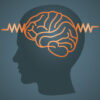Researchers at Leipzig’s Max Planck Institute for Human Cognitive and Brain Sciences have discovered that our linguistic background influences the neural connections that may underlie our thought processes.
The findings were published in NeuroImage.
Using magnetic resonance imaging, researchers were able to peer deep within the brains of native German and Arabic speakers and find distinctive differences in the organization of brain regions associated with these two languages.
A doctoral student on the team of Alfred Anwander and Angela Friederici, Xuehu Wei, compared brain scans of 94 native speakers of two very different languages to demonstrate that the language we are exposed to as children affects the way we are wired as adults. The MRI was used to scan the brains of two groups of native speakers: German speakers and Arabic speakers.
According to the findings, the language networks of native German speakers had a stronger connection to the left cerebral hemisphere. Therefore, the researchers suggest that the free word order and greater dependency distance of sentence elements in German contribute to the language’s complex syntactic processing.
“The current study suggests that the structural language connectome develops and is modulated by environmental factors such as the characteristic processing demands of the native language,” the study’s authors stated.


